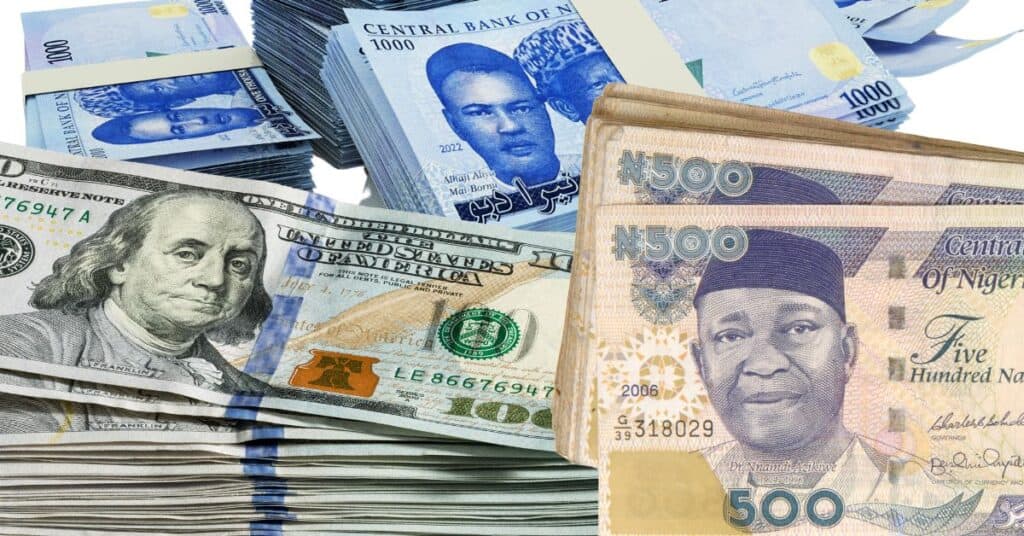Many Nigerians are eager to know how much the dollar to Naira is in the black market, Bureau de Change (BDC), the parallel market, or the Aboki rates; Oga Price is here to keep you updated daily on exchange rates.
The black market rate for Dollar to Naira exchange for today 4th, April 2024, is below:
Buying rate: ₦1,250.00
Selling rate: ₦1,260.00
These Aboki exchange rates are subject to change at any time due to market forces and other factors, so it is recommended that you always check hourly before making any transactions.
The rates to exchange the U.S dollar (USD) and the Naira (NGN) are a topic that constantly sparks conversation in Nigeria.
Let’s examine the complexities of this relationship, specifically focusing on the unofficial black-market rate.
You can also see: Canadian Dollar to Naira Black Market BDC Rate Today
Black Market/Bureau de Change/Parallel Market Rates For Dollar to Naira Today
Information that came from our sources from different cities of the Federation shows that the buying rates of dollar to Naira at the black market (BDC) or Aboki rates range from ₦1,245 to ₦1,250 a dollar while that of the selling rate is between ₦1,260 to ₦1,270 depending on which location you are making the transaction from and how much you are transacting.
In bigger cities like Lagos, Abuja, and Port Harcourt, where there is more pressure on dollars, these rates tend to increase slightly compared to smaller cities and towns.
Dollar(USD) to Naira(NGN) Interbank Exchange Rate Today
As of today, April 4th, 2024, the Dollar to Naira interbank exchange rate is approximately N1,319.6 per $1.
Due to market forces, these rates change slightly from one commercial bank to another.
You should check it with your bank before making any foreign currency transaction.
Dollar to Naira CBN Rate Today
The CBN rate for USD to NGN for today are:
Buying Rate: 1259.99
Selling Rate: 1260.99
Due to market forces, these rates also change slightly from one commercial bank to another.
You should check it with your bank before making any foreign currency transaction.
Why Does a Black Market Exist?
The Central Bank of Nigeria (CBN) exerts influence over the official exchange rate within a range in the managed float system practiced in Nigeria. This mechanism functions to maintain economic stability.
A difference exists between the official rate and the reality of the market, resulting in the black or parallel market due to some factors, including restricted access to foreign exchange and a high demand for dollars.
People make use of the black market for various reasons:
- Shortage of dollars: Banks and authorized dealers may ration dollar sales due to CBN restrictions, which always creates a shortage of dollars.
- Faster transactions: Black market transactions can be quicker than cumbersome official channels, which always take hours, days, weeks, and, in some cases, months.
- Business needs: Businesses engaged in international trade may seek more competitive rates.
Factors Affecting the Black Market Rate
The black market rate is affected by several factors, including the following:
- Central Bank of Nigeria (CBN) Intervention: If the CBN injects more dollars into the official market, it can reduce demand in the black market, leading to a lower black market rate.
- Global Oil Prices: Nigeria’s oil exports are a significant source of dollars. Increasing oil prices strengthens the Naira, which may impact the black market rate.
- Economic Sentiment: Negative financial news can trigger a flight to safety, increasing the demand for dollars and pushing the black market rate upwards.
Risks of Using the Black Market
There are substantial dangers associated with the black market, even though it provides faster access to dollars:
Fraud: There is a significant possibility of encountering counterfeit money or con artists.
Concerns Regarding Safety: Transactions on the black market sometimes occur in insecure environments, raising safety concerns.
Legal Issues: engaging in prohibited activities that can result in penalties violates the law, especially patronizing unlicensed Bureau de Change (BDC).
Alternatives to the Black Market
Thankfully, there are safer and legal options for currency exchange if you want to avoid going through the cumbersome process of banks.
Licensed Bureau de Change: BDCs offer competitive rates and are regulated by the CBN. Therefore, it is safe to use a licensed BDC.
Peer-to-Peer (P2P) Platforms: Platforms like Binance or Patricia connect individuals for money transfers, often with competitive rates.
Domiciliary Accounts: Domiciliary accounts allow Nigerians to hold and transact in foreign currencies like USD.
Conclusion
Understanding how the Dollar-Naira black market rate works is important for anyone wanting to exchange money in Nigeria. The black market might seem faster, but it comes with significant risks. It is strongly suggested that you look into legal and safer options such as licensed BDCs, P2P sites, and domiciliary accounts. Remember that patience and research can keep you from trouble with the law and your money.
- Current Price Of Tokunbo Toyota Venza Engine In Nigeria - November 14, 2024
- Prices Of The Best Natural Hair Products in Nigeria - October 31, 2024
- Current Price Of Tokunbo Mercedes-Benz GLK-Class Engine In Nigeria - October 26, 2024

